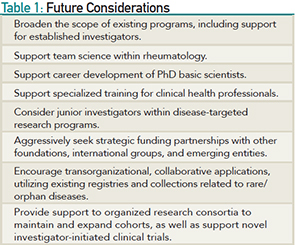Since its inception in 1985, the Rheumatology Research Foundation has provided more than 2,200 awards and grants to medical and graduate students, residents, fellows, physicians, and health professionals. Many of those awards and grants are specifically focused on attracting the best and brightest minds to rheumatology, along with furthering their education and training in the field. The Foundation is committed to achieving those goals as efficiently and effectively as possible to meet the growing and changing needs of the rheumatology community.
In 2008, the Foundation decided to evaluate the awards and grants program. The evaluation enabled the Foundation to make strategic decisions to help eliminate confusion and streamline the program.
The Foundation’s current strategic plan includes a specific objective to ensure the awards and grants program continues to be as organized as possible while serving the most important needs of the rheumatology community. To that end, the awards and grants at the core of the program will be reviewed every five years. This process began again in April 2013, when experts from all areas of rheumatology came together to analyze the program, discuss a variety of issues facing rheumatology, and determine how the Foundation could help address those issues through its awards and grants.
After six months of consideration, members of the review panel shared their thoughtful recommendations. The Foundation’s board of directors has already voted to implement five recommendations that will go into effect later this year. The most notable changes include an expansion of the Foundation’s fellowship training awards, which help offset the costs of training for fellows, and two new award options that will help investigators while they are trying to get funding from the National Institutes of Health. The Foundation will also increase support for the resident research preceptorship award, which focuses on introducing potential researchers to the field of rheumatology by funding a research experience for a resident under the guidance of an experienced investigator.
The review panel also gave a number of recommendations that will take more time to implement. Some of those suggestions include changes to current awards aimed at training future rheumatology professionals and developing their careers. For example, the panel recommended that the Foundation encourage more collaboration among researchers by organizing research consortia within rheumatology, and tracking resources and sharing among investigators.
Another suggestion was to provide more support for the Foundation’s investigator award, which offers funding for rheumatology researchers who have completed their fellowships and are working to establish themselves as independent investigators.
The Foundation also plans to implement the panel’s recommendation to expand the scope of the clinician–scholar educator award, which provides support for rheumatology educators who are developing new teaching strategies to enhance the educational experience for future rheumatologists and rheumatology health professionals.
While many of the recommendations were focused on how the Foundation could make immediate changes to enhance the core of its awards and grants program, the panel also offered some suggestions for the Foundation to consider over the long term (see Table 1).
The Foundation will continue this review process every five years because it is dedicated to growing and evolving the core of its awards and grants program to ensure that it is always providing the rheumatology community what it needs.




